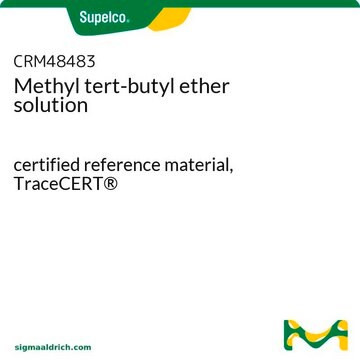08603
tert-Butyl méthyl éther
analytical standard
Synonyme(s) :
MTBE, Éther méthylique tert-butylique
About This Item
Produits recommandés
Qualité
analytical standard
Niveau de qualité
Densité de vapeur
3.1 (vs air)
Pureté
≥99.9% (GC)
Température d'inflammation spontanée
705 °F
Durée de conservation
limited shelf life, expiry date on the label
Limite d'explosivité
15.1 %
Technique(s)
HPLC: suitable
gas chromatography (GC): suitable
Indice de réfraction
n20/D 1.369 (lit.)
n20/D 1.369
Point d'ébullition
55-56 °C (lit.)
Densité
0.74 g/mL at 25 °C (lit.)
Application(s)
environmental
Format
neat
Chaîne SMILES
COC(C)(C)C
InChI
1S/C5H12O/c1-5(2,3)6-4/h1-4H3
Clé InChI
BZLVMXJERCGZMT-UHFFFAOYSA-N
Vous recherchez des produits similaires ? Visite Guide de comparaison des produits
Description générale
Application
Produits recommandés
Mention d'avertissement
Danger
Mentions de danger
Conseils de prudence
Classification des risques
Flam. Liq. 2 - Skin Irrit. 2
Code de la classe de stockage
3 - Flammable liquids
Classe de danger pour l'eau (WGK)
WGK 1
Point d'éclair (°F)
-18.4 °F - closed cup
Point d'éclair (°C)
-28 °C - closed cup
Équipement de protection individuelle
Eyeshields, Faceshields, Gloves
Faites votre choix parmi les versions les plus récentes :
Déjà en possession de ce produit ?
Retrouvez la documentation relative aux produits que vous avez récemment achetés dans la Bibliothèque de documents.
Les clients ont également consulté
Articles
Learn about analyzing organic volatile impurities (OVIs) in pharmaceuticals using SH-GC, focusing on suitable solvents and ensuring compliance.
Notre équipe de scientifiques dispose d'une expérience dans tous les secteurs de la recherche, notamment en sciences de la vie, science des matériaux, synthèse chimique, chromatographie, analyse et dans de nombreux autres domaines..
Contacter notre Service technique










